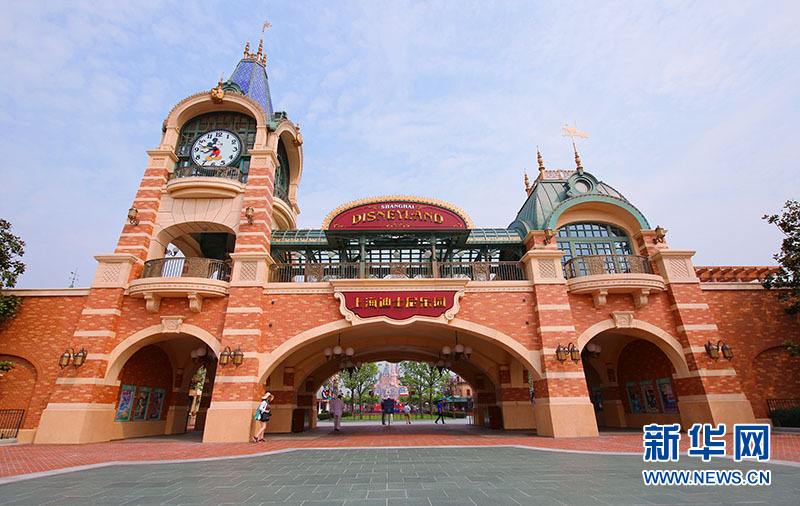


(Photo/Xinhua)
Disneyland is suspected of discriminating against Asian consumers as it has been found to act differently in Asia and other regions when it comes to whether or not it allows visitors to bring food into the park.
Unlike three out of the six Disneyland parks worldwide, which allow customers to bring in their own food and drinks, the three parks in Asia - Tokyo, Hong Kong and Shanghai - carry a no-outside-food-and-drink policy.
Shanghai Disneyland recently triggered heated discussions after a law school student in Shanghai sued the park for forcing her to throw away the snacks she had brought in her backpack before she could enter the park.
To safeguard her interests, the student filed a lawsuit against Shanghai Disneyland, calling for the park's ban to be abolished and for the park to compensate for her loss.
In response to the lawsuit, Shanghai Disneyland said the rule of no outside food and beverage is "consistent with many other theme parks across China."
Shanghai Disneyland has banned outside food, alcohol and nonalcoholic beverages over 600 milliliters inside its park since November 2017, more than a year after its opening.
The rule has revealed a double standard, as well as Disneyland's discrimination against the Asian region, said Yuan Li, a lawyer based in Shanghai.
The policy serves the interests of the park, not the consumers. Such selective use of terms of service is inappropriate, said Qiu Baochang, an expert from the China Consumers Association.
Wei Yilin, a lawyer, said Shanghai Disneyland's regulation of no outside food and beverage is an imparity clause that unilaterally restricts consumer rights. According to China's Law on the Protection of Consumer Rights and Interests, consumers have the right to choose goods or services independently.
Disneyland infringed on consumers' dignity and rights to privacy by searching their bags, said Qiu, who added that searching bags for security purposes is fine, but to search for food is unacceptable.
As of Aug. 13, Shanghai Disneyland staff members were still found searching bags before they were allowed into the park.
However, to defend itself, Shanghai Disneyland told the court that the rule was made to maintain a clean environment within the park, adding that it is necessary as tourists may discard rubbish or bring food or beverages that are potentially dangerous.
The park could ask tourists to behave or establish more dustbins, instead of prohibiting them from bringing food entirely, said Qiu.
Some net users pointed out that the food policy is not related to activities inside the park, but was made only to compel tourists to buy high-priced food and beverages. It is a typical case of making profits through unfair regulations that limit consumer rights.
Indeed, catering services inside the park are costly. For instance, a can of cola is priced at 20 yuan and a bottle of mineral water 10 yuan, much higher than outside the park.
The consumers are free to decide whether or not to buy food or beverages inside the park, said Chen Jian from the China Consumers Association.
As the only Disneyland park in the Chinese mainland, Shanghai Disneyland's tourism policies should be made on an equal basis and show respect for consumer rights, said Chen.
The Supreme People's Court of China has invalidated such regulations imposed by service providers to compel consumers to buy food or beverages or to set a consumption threshold.
 Fire brigade in Shanghai holds group wedding
Fire brigade in Shanghai holds group wedding Tourists enjoy ice sculptures in Datan Town, north China
Tourists enjoy ice sculptures in Datan Town, north China Sunset scenery of Dayan Pagoda in Xi'an
Sunset scenery of Dayan Pagoda in Xi'an Tourists have fun at scenic spot in Nanlong Town, NW China
Tourists have fun at scenic spot in Nanlong Town, NW China Harbin attracts tourists by making best use of ice in winter
Harbin attracts tourists by making best use of ice in winter In pics: FIS Alpine Ski Women's World Cup Slalom
In pics: FIS Alpine Ski Women's World Cup Slalom Black-necked cranes rest at reservoir in Lhunzhub County, Lhasa
Black-necked cranes rest at reservoir in Lhunzhub County, Lhasa China's FAST telescope will be available to foreign scientists in April
China's FAST telescope will be available to foreign scientists in April "She power" plays indispensable role in poverty alleviation
"She power" plays indispensable role in poverty alleviation Top 10 world news events of People's Daily in 2020
Top 10 world news events of People's Daily in 2020 Top 10 China news events of People's Daily in 2020
Top 10 China news events of People's Daily in 2020 Top 10 media buzzwords of 2020
Top 10 media buzzwords of 2020 Year-ender:10 major tourism stories of 2020
Year-ender:10 major tourism stories of 2020 No interference in Venezuelan issues
No interference in Venezuelan issues
 Biz prepares for trade spat
Biz prepares for trade spat
 Broadcasting Continent
Broadcasting Continent Australia wins Chinese CEOs as US loses
Australia wins Chinese CEOs as US loses